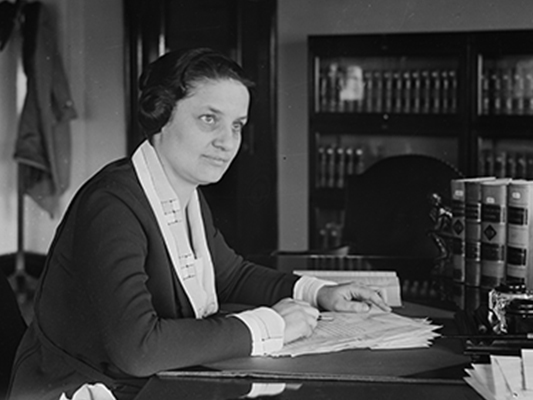Mabel Willebrandt

Born: May 23, 1889, Woodsdale, Kansas
Died: April 6, 1963, Riverside, California
Nicknames: First Lady of the Law, Prohibition Portia
Associations: Prohibition, the Volstead Act, President Warren G. Harding, President Herbert Hoover, U.S. Justice Department
Mabel Walker Willebrandt was the assistant attorney general for the Justice Department charged with enforcing Prohibition from 1920 to 1933. Willebrandt served through most of the period – 1921 to 1929. It was a job she was good at – and one that many of her male colleagues refused to take on. Willebrandt not only took on the unpopular job of prosecuting bootleggers and rumrunners, she had authority over prosecuting tax cheats, another unpopular assignment. Combining the two helped bring down some of the nation’s biggest gangsters.
Willebrandt might seem an unlikely hero of the anti-liquor crusaders. She didn’t support Prohibition. She was a progressive Republican and a public defender who provided free legal services to prostitutes and other women.
But when Senator Hiram Johnson, also a progressive Republican, nominated her for assistant attorney general in the new administration of President Warren Harding in 1921, she received unanimous support from federal judges in California, where she was practicing.
Willebrandt, throughout her federal tenure, battled governmental indifference, interference and outright corruption to enforce the Volstead Act, the federal law that put teeth into the 18th Amendment establishing Prohibition. And although she did not support Prohibition, she personally abstained from alcohol while the law was in effect.
Beyond her work on Prohibition and tax issues, Willebrandt was a prison reformer who established federal facilities for young men and for women, and started educational programs in the federal system. She won an award for her prison reform efforts from the National Committee for Prisons and Prison Labor in 1925.
While her work won her friends among Prohibition supporters, it also generated criticism from opponents. One politician called her “Prohibition Portia,” a reference to Portia Catonis, the wife of Brutus and one of the assassins of Julius Caesar, for her zeal in enforcing the law.
Willebrandt campaigned hard for Herbert Hoover’s presidential re-election campaign in 1928 and she expected to be rewarded with the attorney general position. Instead, she was passed over, and in 1929 she responded with her resignation. She went into private practice in her adopted California; among her clients were former bootleggers, but Willebrandt specialized in entertainment and aviation law.
→Read more about Willebrandt here




